This term is used to describe a normal sized head.
What is normocephalic?
The name of the opening between the eyelids.
What is the palpebral fissure?
Type of hearing loss that occurs gradually and is common in older adults.
What is presbycusis?
The medical term for nosebleeds.
What is epistaxis?
Name 2 landmarks used in palpation of the thyroid.
What are the cricoid cartilage and thyroid cartilage?
Topical fluorescein staining and Wood's lamp evaluation can be used to diagnose this ophthalmic injury.
What is a corneal abrasion?
Name the four cranial bones.
What are frontal, temporal, parietal, and occipital?
Describe what PERRLA means.
What is pupils equal round reactive to light and accommodation?
What are the whisper test (finger rub test), Weber, and Rinne test?
Describe the test for nasal patency and why it is performed.
What is the patient is instructed to occlude each nostril and breathe in and out with the mouth closed. It is used to assess for any blockages in the nasal passage.
Name at least 3 types of lymph nodes palpable in the neck.
What are the anterior cervical, posterior cervical, deep cervical nodes.
Name the structure/s highlighted blue in the CT image below.
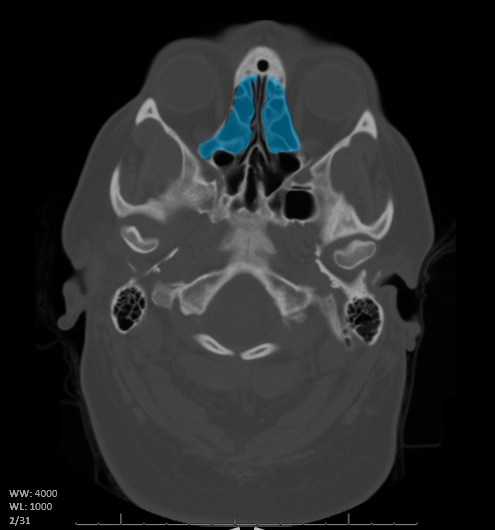
What are the ethmoid sinuses?
The only sinuses present at birth.
What are the maxillary and ethmoid sinuses?
Corneal opacities, such as cataracts, are best evaluated with this type of lighting.
What is oblique lighting?
Insufflation of the tympanic membrane should not be performed in this scenario.
What is suspicion of TM perforation?
The turbinates visualized during a speculum exam.
What are the middle and inferior turbinates?
Describe the abnormal physical exam finding in the picture below.
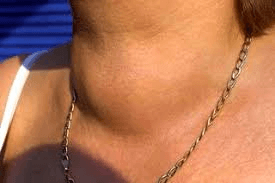
What is a thyroid goiter?
Name the fracture shown in the CT image below and the complication typically associated with this injury.
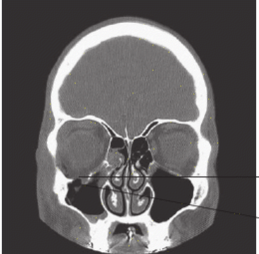
What is a blow-out orbital fracture and ocular muscle entrapment?
Name four abnormal findings assessed when palpating the scalp.
What are corneal light reflex, accomodation, cover/uncover test, convergence/divergence, EOM, peripheral angles, corneal reflex.
Weber lateralizes to the right ear.
BC > AC in the right ear.
What is conductive hearing loss of the right ear?
Unilateral, purulent, thick, greenish, malodorous nasal discharge is associated with this condition.
What is a nasal foreign body?
What is ausculatate with the bell of the stethoscope for a thyroid bruit?
Name the radiologic view of the skull shown below?
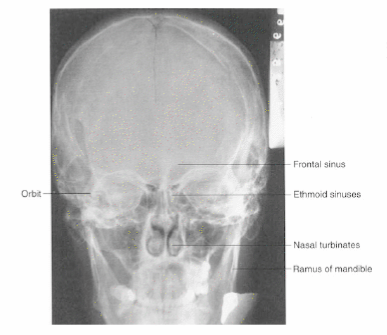
What is a Caldwell (PA) view of the skull?
The physical exam finding (shown here) associated with Cushing's Syndrome.
What is "moon facies"?
Describe the physical exam finding below.

What is ptosis?
Describe the physical exam finding shown in the picture below.
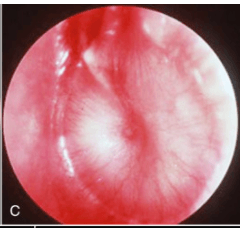
What is an erythematous, bulging (loss of landmarks) TM?
Describe the abnormal physical exam finding in the picture below.
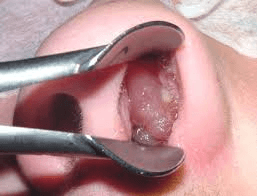
What is a nasal polyp?
Describe the physical exam finding in the picture below and name 3 possible causes of the condition.

What is hairy tongue?
What is poor hygeine, dry mouth, abx use, tobacco/ alcohol use?
Describe the radiologic finding in the CT below.
What is bilateral maxillary sinusitis?